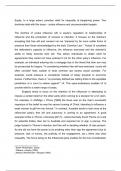Equity, to a large extent, provides relief for inequality of bargaining power. Two
doctrines deal with this issue – undue influence and unconscionable bargain.
The doctrine of undue influence (UI) is equity’s regulation of relationships of
influence and the production of consent or intention. It focuses on the claimant,
accepting that free will and consent can be “impaired by far more subtle forms of
pressure than those acknowledged by the early Common Law.” 1 Actual UI considers
the defendant’s capacity to influence, the influence exercised and the claimant’s
ability to freely exercise their will. This allows individuals to obtain relief for
agreements they would not have entered if not for the other party’s influence. For
example, an individual entering into a mortgage due to the threat that their son may
be prosecuted for forgery.2 In considering whether free will was exercised, courts will
often consider facts outside of what common law duress would consider. For
example, social pressure is considered instead of solely physical or economic
duress. Furthermore, there is “no precisely defined law setting limits to the equitable
jurisdiction of a court to relieve against” 3 UI. This open-endedness enables UI to
provide relief to a wider range of cases.
England tends to focus on the intention of the influencer in attempting to
impose a certain belief on the other party when coming to a decision for a UI claim.
For example, in Nottidge v Prince [1860] the focus was on the man’s successful
imposture of the belief he was the second coming of Christ, intending to influence a
weak woman to gift him her fortune. 4 In contrast, Australia tends to look more at the
influenced party’s free will and autonomy in coming to an agreement. A good
example of this is Thorne v Kennedy [2017] – where Kennedy found Thorne on a site
for potential brides, flew her to Australia and required her to sign a prenup. The
judge looked to Thorne’s intention and free will in deciding whether UI was present.
As she did not have the power to do anything other than sign the agreement (due to
pressure, lack of money, the publicity of the engagement, etc.), there was clear
inequality. The focus being on the influenced party enables for the true consideration
1
Sarah Worthington, Equity
2
Williams v Bayley [1866]
3
National Westminster v Morgan [1985]
4
, of different types of vulnerability and circumstances that may contribute to an
individual entering to an agreement.
Presumed UI protects relationships where pressure may be present,
especially where vulnerable individuals are concerned. If trust and confidence and a
questionable transaction are proven, the burden will be shifted onto the defendant
who must show that the consent was freely given. As this is quite simple and open-
ended, it is not incredibly difficult for a claimant to establish. There are two
categories of trust and confidence – trust-based and fact-based relationships.
Status-based relationships have an irrebuttable presumption of influence, such as
parents and child relationships or trustee and beneficiary relationships. As Sarah
Worthington states, Equity’s strategy is “aggressive” 5 - it presumes influence due to
the nature of the relationship, and that it is undue “because of the manifest
advantage inherent in the deal.” 6 This makes it easier for a claimant to succeed in
their claim and accounts for the fact that these relationships almost always involve
one party holding more power, knowledge, and influence. Fact-based relationships
require proof of trust and confidence in relationships where there isn’t the
presumption of influence. For example, married couples 7 or employer and
employees.8 This permits those who would not be able to claim under a status-based
relationship to still be able to bring a claim and obtain relief.
However, the difference in England and Australia’s approaches can make a
significant impact in UI’s ability to provide sufficient relief to parties with inequalities
in bargaining power. The defendant can rebut a claim by proving that the claimant
exercised their free will – by showing that they “took legal advice on the matter but
still pursued the arrangement.”9 This is problematic if the advice given is “ignored,
manifestly inadequate, or misunderstood.” For example, the solicitor telling Ms.
Thorne that the prenup is terrible, but due to the influence Kennedy has over her,
Thorne not feeling that she has a choice and entering into the agreement anyway.
Though legal advice would have been taken, Thorne would not have fully exercised
free will without influence. Focusing on the influencer’s conduct, as England does,
may result in the influencer succeeding solely by proving the other party’s free will
5
N.1
6
Ibid.
7
N.3
8
Credit Lyonnais v Burch [1977]
9
N.1




